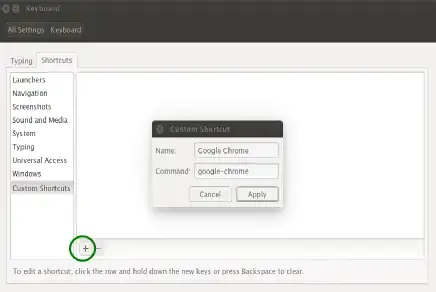Can I set up keyboard shortcuts for each input language? For example I want to set "Ctrl + 8" for English, "Ctrl + 9" for Ukrainian and "Ctrl + 0" for Russian languages. I don't want to switch and search language I need. It takes time. I want directly to turn language I want. I had this ability in Windows. Maybe I need to install some plugin?
5 Answers
Go to System Settings - Keyboard - Shortcuts. Click on "Add" button.
(See here for how to create a custom shortcut: http://web.archive.org/web/20150705203244/http://bigknol.com/create-custom-keyboard-shortcuts-in-ubuntu-for-launching-chrome-firefox/)
For the name write,for example name of the input language - "English".
For the command write
gsettings set org.gnome.desktop.input-sources current 0
Here 0 indicates the number of the input language. (0 for the first one, 1 for the second one, etc.)
Then press on create a shortcut button and press the key combination you want.
Change the number according to the order of input languages. For example write
gsettings set org.gnome.desktop.input-sources current 1
for creating a shortcut for the second language.
- 5,431
- 5,597
As far as current is deprecated for org.gnome.desktop.input-sources in GNOME 3.2 so for Ubuntu 18.04, you can use one of the following commands:
For the first language:
gdbus call --session --dest org.gnome.Shell --object-path /org/gnome/Shell --method org.gnome.Shell.Eval "imports.ui.status.keyboard.getInputSourceManager().inputSources[0].activate()"For the second language:
gdbus call --session --dest org.gnome.Shell --object-path /org/gnome/Shell --method org.gnome.Shell.Eval "imports.ui.status.keyboard.getInputSourceManager().inputSources[1].activate()"
- 318
-
So this is applicable only for GNOME DE? What if I use XFCE? – Suncatcher Mar 09 '18 at 12:27
-
This really should be up-voted since the accepted answer no longer works :) – qrikko Mar 22 '21 at 15:03
Since Ubuntu 22.04 GNOME no longer allows the use of input-sources or accepts Eval() natively so you have to use the following workaround.
- Install GNOME extension Eval-GJS - This extension provides unrestricted Eval() dbus method for running arbitrary code in the compositor.
https://github.com/ramottamado/eval-gjs.git cd eval-gjs make install
- Install gnome-shell-extension-manager
sudo apt install gnome-shell-extension-manager
Logout and re-login
Launch gnome-shell-extension-manager and enable Eval-GJS
Go to Settings -> Keyboard -> Keyboard Shortcuts and add a custom shortcut with the following command:
gdbus call --session --dest org.gnome.Shell --object-path /dev/ramottamado/EvalGjs --method dev.ramottamado.EvalGjs.Eval "imports.ui.status.keyboard.getInputSourceManager().inputSources[0].activate()"
Replace the index in inputSources[0] with the actual index of the input method you wish to change to. First layout will be inputSources[0], second layout will be inputSources[1] and so on.
- 19
- 2
-
And since Ubuntu 23.04 Eval-GJS "is incompatible with the current GNOME version" :( – fetsh Mar 21 '23 at 12:50
-
Ok, Eval-GJS have to up the version in manifest, to make it work with current GNOME, but for now this should work: https://github.com/fetsh-edu/eval-gjs/commit/f7ef9d363f59d7578d423081d0e393c1a4096374 – fetsh Mar 21 '23 at 16:52
I find ironic how answers under this question summarize the long history of modeless (stateless) layout switching in Ubuntu and its complicated fate.
- The
setxkbmapdoesn't play nice with the GNOME Shell. It doesn't update the UI indicator and it breaks the usual configured layout switching shortcut. - The
gsettings set org.gnome.desktop.input-sources currentis deprecated and doesn't work anymore - The
gdbus call … org.gnome.Shell.Eval …is also deprecated due to security implications. - There is a replacement for the
Eval: ramottamado/eval-gjs, but it doesn't solve the security issue. In fact, it introduces them! A quote from their README:
The extension at https://extensions.gnome.org/extension/XXXX/eval-gjs/ was not uploaded nor maintained by me. Please refrain from installing this extension at all.
So, I've made my own GNOME Shell Extension and I'm sharing it with the world: Shyriiwook (also available @ GitHub: madhead/shyriiwook).
This is a very simple, minimalist extension. It doesn't have any GUI. After installing it, a new D-Bus interface would be exposed in your GNOME Shell session. You could query it for the current configuration or call a method to activate the desired layout:
$ gdbus introspect \
--session \
--dest org.gnome.Shell \
--object-path /me/madhead/Shyriiwook \
--only-properties
node /me/madhead/Shyriiwook {
interface me.madhead.Shyriiwook {
properties:
readonly as availableLayouts = ['us', 'uk', 'ru'];
readonly s currentLayout = 'uk';
};
};
$ gdbus call
--session
--dest org.gnome.Shell
--object-path /me/madhead/Shyriiwook
--method me.madhead.Shyriiwook.activate "us"
This is easily scriptable, and you can even put this command raw into a custom shortcut under the "Settings" → "Keyboard" → "Keyboard Shortcuts" → "View and Customise Shortcuts" → "Custom Shortcuts". You could have one per every language you want.
- 702
- 3
- 10
